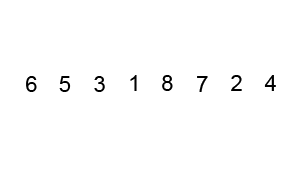Bubble Sort
Parameters#
| Parameter | Description |
|---|---|
| Stable | Yes |
| In place | Yes |
| Best case complexity | O(n) |
| Average case complexity | O(n^2) |
| Worst case complexity | O(n^2) |
| Space complexity | O(1) |
| ## Bubble Sort | |
The BubbleSort compares each successive pair of elements in an unordered list and inverts the elements if they are not in order. |
The following example illustrates the bubble sort on the list {6,5,3,1,8,7,2,4} (pairs that were compared in each step are encapsulated in ’**’):
{6,5,3,1,8,7,2,4}
{**5,6**,3,1,8,7,2,4} -- 5 < 6 -> swap
{5,**3,6**,1,8,7,2,4} -- 3 < 6 -> swap
{5,3,**1,6**,8,7,2,4} -- 1 < 6 -> swap
{5,3,1,**6,8**,7,2,4} -- 8 > 6 -> no swap
{5,3,1,6,**7,8**,2,4} -- 7 < 8 -> swap
{5,3,1,6,7,**2,8**,4} -- 2 < 8 -> swap
{5,3,1,6,7,2,**4,8**} -- 4 < 8 -> swapAfter one iteration through the list, we have {5,3,1,6,7,2,4,8}. Note that the greatest unsorted value in the array (8 in this case) will always reach its final position. Thus, to be sure the list is sorted we must iterate n-1 times for lists of length n.
Graphic:
Implementation in Javascript
function bubbleSort(a)
{
var swapped;
do {
swapped = false;
for (var i=0; i < a.length-1; i++) {
if (a[i] > a[i+1]) {
var temp = a[i];
a[i] = a[i+1];
a[i+1] = temp;
swapped = true;
}
}
} while (swapped);
}
var a = [3, 203, 34, 746, 200, 984, 198, 764, 9];
bubbleSort(a);
console.log(a); //logs [ 3, 9, 34, 198, 200, 203, 746, 764, 984 ]Implementation in C#
Bubble sort is also known as Sinking Sort. It is a simple sorting algorithm that repeatedly steps through the list to be sorted, compares each pair of adjacent items and swaps them if they are in the wrong order.
Implementation of Bubble Sort
I used C# language to implement bubble sort algorithm
public class BubbleSort
{
public static void SortBubble(int[] input)
{
for (var i = input.Length - 1; i >= 0; i--)
{
for (var j = input.Length - 1 - 1; j >= 0; j--)
{
if (input[j] <= input[j + 1]) continue;
var temp = input[j + 1];
input[j + 1] = input[j];
input[j] = temp;
}
}
}
public static int[] Main(int[] input)
{
SortBubble(input);
return input;
}
}Implementation in C & C++
An example implementation of BubbleSort in C++:
void bubbleSort(vector<int>numbers)
{
for(int i = numbers.size() - 1; i >= 0; i--) {
for(int j = 1; j <= i; j++) {
if(numbers[j-1] > numbers[j]) {
swap(numbers[j-1],numbers(j));
}
}
}
}C Implementation
void bubble_sort(long list[], long n)
{
long c, d, t;
for (c = 0 ; c < ( n - 1 ); c++)
{
for (d = 0 ; d < n - c - 1; d++)
{
if (list[d] > list[d+1])
{
/* Swapping */
t = list[d];
list[d] = list[d+1];
list[d+1] = t;
}
}
}
}Bubble Sort with pointer
void pointer_bubble_sort(long * list, long n)
{
long c, d, t;
for (c = 0 ; c < ( n - 1 ); c++)
{
for (d = 0 ; d < n - c - 1; d++)
{
if ( * (list + d ) > *(list+d+1))
{
/* Swapping */
t = * (list + d );
* (list + d ) = * (list + d + 1 );
* (list + d + 1) = t;
}
}
}
}Implementation in Java
public class MyBubbleSort {
public static void bubble_srt(int array[]) {//main logic
int n = array.length;
int k;
for (int m = n; m >= 0; m--) {
for (int i = 0; i < n - 1; i++) {
k = i + 1;
if (array[i] > array[k]) {
swapNumbers(i, k, array);
}
}
printNumbers(array);
}
}
private static void swapNumbers(int i, int j, int[] array) {
int temp;
temp = array[i];
array[i] = array[j];
array[j] = temp;
}
private static void printNumbers(int[] input) {
for (int i = 0; i < input.length; i++) {
System.out.print(input[i] + ", ");
}
System.out.println("\n");
}
public static void main(String[] args) {
int[] input = { 4, 2, 9, 6, 23, 12, 34, 0, 1 };
bubble_srt(input);
}
}Python Implementation
#!/usr/bin/python
input_list = [10,1,2,11]
for i in range(len(input_list)):
for j in range(i):
if int(input_list[j]) > int(input_list[j+1]):
input_list[j],input_list[j+1] = input_list[j+1],input_list[j]
print input_list